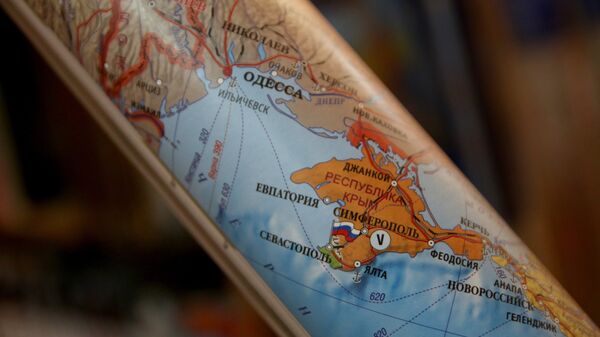On Monday, Ukrainian Foreign Minister Pavlo Klimkin promised that Ukraine would soon be lodging a claim with international courts over supposed Russian violations of the 1982 UN Convention on the Law of the Sea in Crimean territorial waters, the Black and Azov seas and the Kerch Strait, as well as "rights to natural resources of the continental shelf."
Responding to Kiev officials' comments about suing Russia, Crimean Deputy Prime Minister Ruslan Balbek told Russia's RIA Novosti news agency that maybe it's time for Crimea to file a lawsuit of their own against Ukraine instead.
"Crimea has the right to file a countersuit, and demand that Ukraine compensates us for the looting of the peninsula over the course of two decades. During this time, under the 'patronage' of Kiev authorities, Crimean lands and real estate were sold for a pittance. Kiev took all of the taxes collected here, but invested nothing into our infrastructure or the local economy," the official complained.
Moreover, Balbek suggested that Kiev officials' statements were little more than 'populist claims', and do not carry any legal consequences for Crimea or for Russia. "It's possible that Kiev will find a court that will issue a ruling requiring Russia to submit to the demands made by Ukraine. But these demands will be fulfilled only in the fevered imaginations of the judges, and the delirious minds of Ukrainian politicians."
Speaking to Svobodnaya Pressa, international law expert Kamil Bekyashev noted that he was surprised by the Ukraine's lawsuit threats, and specifically by the fact that Kiev intends to use the UN Convention on the Law of the Sea. Russia, he noted, has not violated the rules established by that convention in any way.
"This document," the expert explained, "regulates issues relating to maritime areas outside the zones of national jurisdiction; otherwise, they are regulated by the laws of the states to which they belong. In the case of Crimea, which is part of Russia, these are the laws of our country relating to fishing in coastal areas, the extraction of mineral resources, the passage of ships through territorial waters, and so on. Our legislation is fully consistent with the UN Convention of the Law of the Sea."
Kiev, Bekyashev noted, believes that it, as before, should be allowed to engage in fishing, to extract mineral resources and to perform other activities in the exclusive economic zone around Crimea. "But that ship has sailed, metaphorically speaking, and will never come back. Ukraine has lost its sovereign rights to these territories."
For his part, Dr. Dmitri Labin, a professor of international law at the Moscow State Institute of International Relations, emphasized that in his professional opinion, Kiev has failed to define the issue correctly, since the Convention of the Law of the Sea does not answer questions regarding state sovereignty or ownership of a territory by a particular country. "The Convention does not offer answer questions about the legitimacy of a territory's transfer from one country to another. Therefore, attempting to use this document to challenge the sovereignty of another country is simply absurd."
With regard to Crimea's legal status as part of Russia, Labin suggested that "no one in the international community has yet to present a complaint against Russia in a professional and competent matter regarding the peninsula's accession to Russia. In my view, Crimea's entry into the Russian Federation was carried out entirely within the framework of international law, and as far as I know, many experts share this view. Moreover, it is international law specifically which allowed the residents of the peninsula to formalize their will" and intention to rejoin Russia.
As for the UN Convention on the Law of the Sea, it can be used to determine things like how many nautical miles from its coast Russia has sovereignty over, the zone of its exclusive economic interests, etc. "Ukraine does not have access to the sea in this particular stretch of the coast, and therefore cannot prove its rights to these waters. To claim otherwise is absurd, and no international lawyer will be able to find any grounds to think otherwise. If the sovereignty issue has been resolved, trying to challenge it using documents that are irrelevant to the matter at hand is nothing short of odd."




